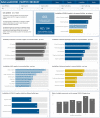Digital health systems strengthening in Africa for rapid response to COVID-19
- PMID: 36925782
- PMCID: PMC10012758
- DOI: 10.3389/frhs.2022.987828
Digital health systems strengthening in Africa for rapid response to COVID-19
Abstract
The COVID-19 pandemic has painfully exposed the constraints of fragile health systems in low- and middle-income countries, where global containment measures largely set by high-income countries resulted in disproportionate collateral damage. In Africa, a shift is urgently needed from emergency response to structural health systems strengthening efforts, which requires coordinated interventions to increase access, efficiency, quality, transparency, equity, and flexibility of health services. We postulate that rapid digitalization of health interventions is a key way forward to increase resilience of African health systems to epidemic challenges. In this paper we describe how PharmAccess' ongoing digital health system interventions in Africa were rapidly customized to respond to COVID-19. We describe how we developed: a COVID-19 App for healthcare providers used by more than 1,000 healthcare facilities in 15 African countries from May-November 2020; digital loans to support private healthcare providers with USD 20 million disbursed to healthcare facilities impacted by COVID-19 in Kenya; a customized Dutch mobile COVID-19 triage App with 4,500 users in Ghana; digital diaries to track COVID-19 impacts on household expenditures and healthcare utilization; a public-private partnership for real-time assessment of COVID-19 diagnostics in West-Kenya; and an expanded mobile phone-based maternal and child-care bundle to include COVID-19 adapted services. We also discuss the challenges we faced, the lessons learned, the impact of these interventions on the local healthcare system, and the implications of our findings for policy-making. Digital interventions bring efficiency due to their flexibility and timeliness, allowing co-creation, targeting, and rapid policy decisions through bottom-up approaches. COVID-19 digital innovations allowed for cross-pollinating the interests of patients, providers, payers, and policy-makers in challenging times, showing how such approaches can pave the way to universal health coverage and resilient healthcare systems in Africa.
Keywords: Africa; COVID-19; digital; epidemic preparedness; health systems.
Copyright © 2022 Rinke de Wit, Janssens, Antwi, Milimo, Mutegi, Marwa, Ndili, Owino, Waiyaiya, Garcia Rojas, Dolfing, de Graaff, Swanepoel, van der Graaf, Mulder, De Sanctis, Kratule, Koyuncu, Rogo, Gómez-Pérez and Spieker.
Conflict of interest statement
Authors TR, MD, AG, MG, TD, SK, CK, GG-P, NS, MA, EM, HM, NN, WO, and EW were or are employed by PharmAccess Foundation. The remaining authors declare that the research was conducted in the absence of any commercial or financial relationships that could be construed as a potential conflict of interest.
Figures











References
-
- Rocha R, Atun R, Massuda A, Rache B, Spinola P, Nunes L, et al. Effect of socioeconomic inequalities and vulnerabilities on health-system preparedness and response to COVID-19 in Brazil: a comprehensive analysis. Lancet Glob Health. (2021) 9:e782–92. 10.1016/S2214-109X(21)00081-4 - DOI - PMC - PubMed
LinkOut - more resources
Full Text Sources

